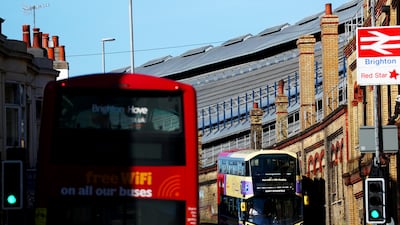Swingeing cuts to UK bus services in regions outside London mean there will be up to 70 per cent fewer people on buses than before the coronavirus pandemic, a report released Tuesday says.
The Urban Transport Group report says the impact will be akin to Covid lockdown restrictions, when numbers using public transport plunged.
The report's release prompted a UK transport chief to say bus services in the UK were on a “precipice".
Government financial support for buses in England outside the capital has allowed transport authorities and bus operators to keep services running during this extended fallow period. This support is due to expire on April 5.
The report — Continuing Covid Funding Support for Urban Public Transport — warns that bus patronage in metropolitan areas could fall to 70 per cent of pre-Covid levels within a year of the end of funding, owing to a combination of service reductions, higher fares and changing travel habits.
Pre-pandemic, 901 million bus trips were made in city regions outside London (the metropolitan areas).
The report projects that over a quarter of bus services could be lost without further funding.
“Once government Covid-related financial support ceases at the end of March, operators will be faced with a position where their revenues are below pre-pandemic levels and their operating costs are similar, if not greater, than they were pre-pandemic,” the report says.
“This position will not be financially sustainable. Bus operators are likely to respond by cutting services and increasing fares. This would lead to further decline in bus patronage.”
Call to extend bus support for another year
The report recommends that to stop any further decline, government financial support should be extended for at least another year.
It models two funding scenarios for the metropolitan areas over the next year which would support the restoration of bus patronage. In the first scenario, £245 million would be needed to maintain bus patronage at 85 per cent of pre-pandemic levels. In the second scenario, £450 million would be needed for bus patronage get closer to 95 per cent of pre-pandemic levels.
Urban Transport Group
Given that the government’s support for urban public transport since the start of the pandemic has averaged at around £1 billion per year, the level of support needed to stop further decline after the current funding expires would be less than the level of support provided previously.
“We are standing on the precipice of a huge reduction in bus services, which could deal a devastating blow to passengers who rely upon them,” Laura Shoaf, chairwoman of the Urban Transport Group, and chief executive at West Midlands Combined Authority,
“Once public transport patronage is lost, it is very hard to get back, and we are facing a vicious circle of decline whereby reduced bus networks lead to services being less attractive or buses simply not being available, which forces operators to raise fares, further reducing passenger numbers.
“As the modelling in this report shows, there is a solution to stemming the decline in bus patronage, which is for government to extend its current financial support beyond March.
“Only this action will secure vital bus services which are under threat, allow patronage to recover, and ensure that the bus can contribute to government’s aspirations around levelling-up and decarbonisation.”
Public transport retrenchment at the worst time
The report also addresses light rail services, whose use has been similarly reduced by the pandemic and only kept afloat by government support.
This support is set to expire at the end of March and the report predicts a large drop in light rail patronage too, although it does not give figures, because a detailed assessment wasn't made.
In a bid to counteract funding cuts, public transport fares in the UK outside the capital are set to rise 3.8 per cent this year.
London does not escape the countrywide trend. Mayor Sadiq Khan on Monday announced the biggest London Tube and bus fare increase in a decade, with prices to rise by an average of nearly 5 per cent.
Public transport and better urban mobility are important to the UK government's commitment to reach net zero emissions by 2050. The UK is also facing a cost of living crisis fuelled by rampant inflation and rising energy prices, which the public transport debacle will only compound.
“Investing now in revenue support to maintain patronage has the potential to be more cost effective than paying later to invest in capital schemes intended to try and get that demand back,” says the report.
“It would allow time for there to be a debate about how in the medium to long term, the public sector supports public transport provision with the goal of levelling-up and decarbonising the country’s transport network and supporting wider economic, social and environmental policy goals.”

